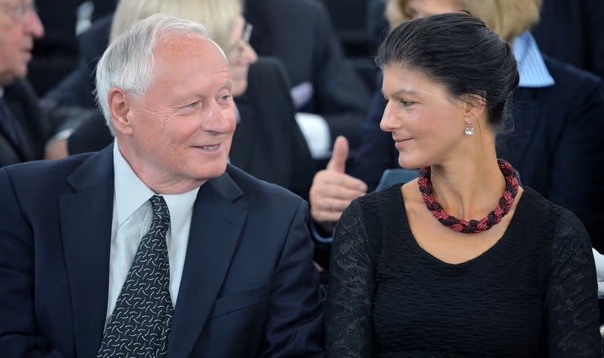Left-wing German politician Sahra Wagenknecht is forming a new party, Bündnis Sahra Wagenknecht-für Vernunft und Gerechtigkeit (Bündnis Sahra Wagenknecht-für Vernunft und Gerechtigkeit). With its likely “left-authoritarian” programme, the BSW seems poised to shake up the German system, The Loop reports.
In 2016, Wagenknecht led the opposition in the Bundestag, representing the left-wing Die Linke party. At a conference in Magdeburg, after she contradicted her party on a number of issues, anti-fascist protesters hit her in the face with a chocolate cake. Nearly eight years later, Wagenknecht gave a press conference to announce the formation of her own party. The BSW is currently ahead of its former associates in the polls.
The new party can take votes away from almost all other parties, so this event has the potential to fundamentally change Germany’s party system. In addition to the radical left, the BSW challenges the centre-left-liberal ruling coalition by attracting voters dissatisfied with unpopular policies and economic problems. Culturally, it competes with the protagonist of anti-government sentiment, the right-wing Alternative for Germany (Alternative für Deutschland, AfD), by strongly criticising the government’s recent progressive policies. Outside Germany, she illustrates a broader dilemma and conflict brewing within the ranks of the European left: who to represent.
Wagenknecht swears allegiance to a forgotten, underrepresented constituency. This voter has been discarded by fiscal conservative policies and has been suppressed by cultural changes in society. They may support a strong welfare state with generous benefits, but they do not welcome an immigration system.
In the abstract, Wagenknecht’s target voter is an economic leftist but a cultural conservative or even an authoritarian. The European left has long struggled to favour this prototypical voter (“left-wing authoritarian”) over its other strong base of support (voters with extreme leftist and culturally progressive views). Most radical left parties in Europe have chosen the latter, leaving the authoritarian left without a clear political home, according to the Loop.
When citizens cannot find a single political force that matches their views, they become alienated from the system as a whole. They tend to abstain from participating in elections, vote for populist parties, and have a negative view of democracy. And from a normative point of view, failure to represent the interests of the general population is simply not a good thing.
However, it depends on the country whether these voters are really a significant part of the population. While in some countries they are a majority, in others their share is still in the single digits. And in Western Europe, there has been a clear downward trend in their share over the last decade. The only countries that have seen a (slight) rise in left-wing authoritarians are those in which their share was small to begin with. Overall, fewer people in most countries identify themselves as left-authoritarian in 2019 than in 2009, the Loop reports.
Notably, the underrepresentation of left-wing authoritarians is not a universal phenomenon, but a predominantly Western European one. In Eastern and Central Europe, such parties have abounded since democratisation. Among the region’s left-radical parties, the Communists of Moldova and the Czech Republic, as well as the Communists of Ukraine (until they were banned in 2015), remain convinced authoritarians. The social-democratic parties in Slovakia, Bulgaria and the Czech Republic, on the other hand, are authoritarian.
However, most authoritarian radical-left parties have been losing voters in recent years. In the Czech Republic, the Communists recently lost all their seats in parliament. In Moldova, they merged with the Social Democrats to avoid the same fate.
Some of their Western European counterparts do not place much emphasis on cultural progressivism. But these parties are not doing too well either. The Communists in Greece and Portugal are holding on to mid-single digits in recent elections. The Dutch Socialist Party’s votes have been stagnant and declining since 2006 (down to around 3 per cent in the latest polls). In general, for those parties already trying to appeal to the authoritarian left, this recipe is not working well.
Some recent polls predict an encouraging start for Wagenknecht’s new party, with numbers in the low double digits. However, this is far below the high hopes that previous polls showed.
BSW is currently a “registered association”; the party has not yet been formally established. At this stage, it does not yet have a clear political platform and remains centred around Wagenknecht’s personality. However, it can be assumed that the positions of the BSW will be much the same as those that Wagenknecht has held in the past. This is hard economic leftism combined with a restrictive immigration policy, conservative views on social issues and a pronounced populism.
On the one hand, it is far from certain that left-wing authoritarianism will persist among voters (although Germany is an exception, as it has seen a slight rise in the last decade). Moreover, left-authoritarian parties are declining even faster than the people who vote for them. Thus, it is not a fact that left-authoritarian voters will automatically come for a similar party, according to the Loop.
Finally, in terms of populism, a party is not unique. Populist parties, most pronounced on the right, are on the rise across Europe. Wagenknecht’s new party enters a crowded field of the populist and cultural right, and it is unclear whether there is much authoritarian ground left for the left. And, as many other former challengers across Europe will attest, it is difficult to maintain a party on the basis of populism alone.
